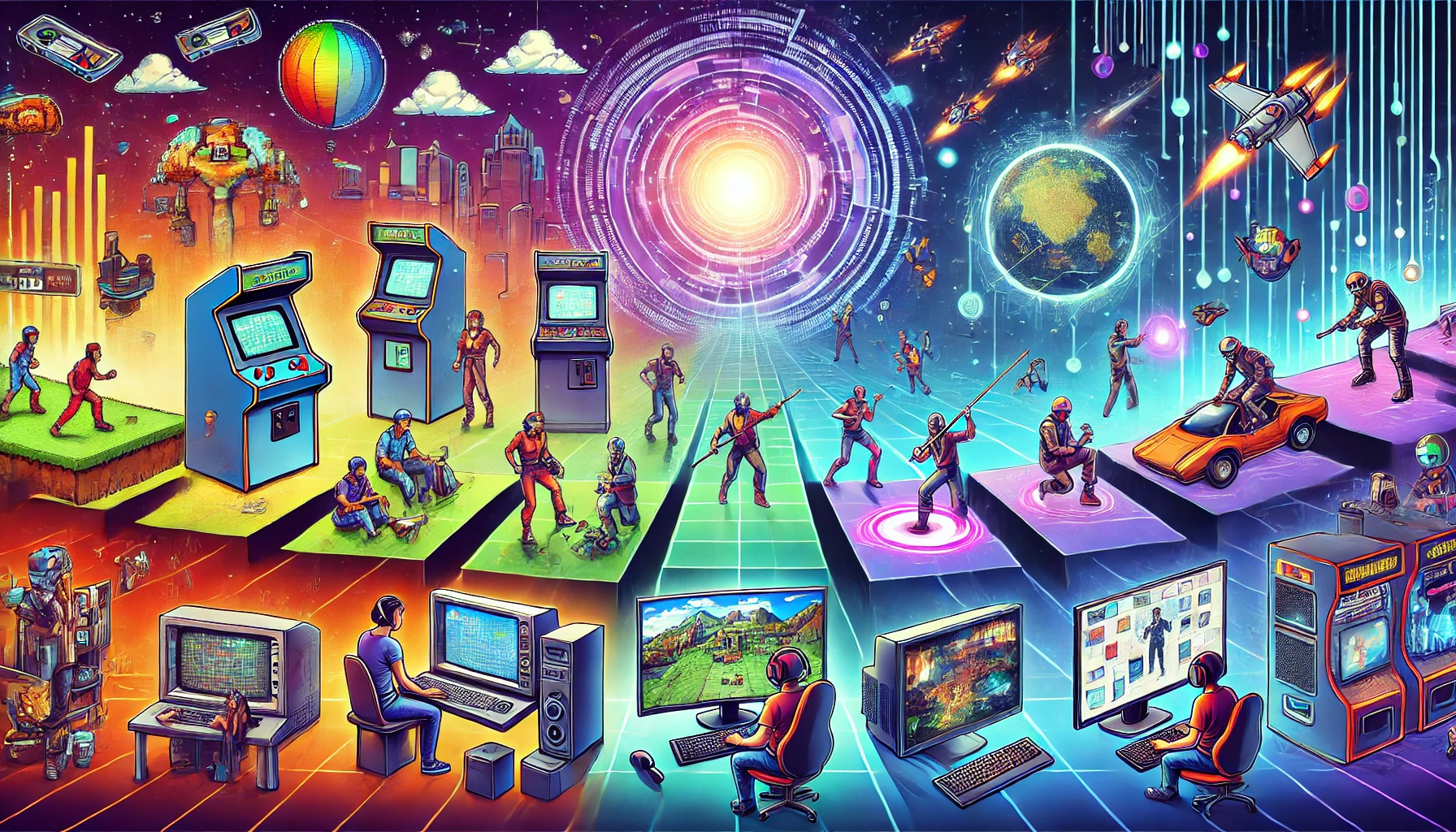The story of online gaming is one of technological advancements, creative ingenuity, and cultural shifts. From its early days with basic pixelated games to today’s immersive virtual environments, online gaming has become a global sensation. This article explores the history, key milestones, and the future of this dynamic field.
The Early Days: The Birth of Online Gaming
Online gaming began in the 1970s and 1980s, when mainframe computers allowed players to connect and play simple text-based games.
1. Multi-User Dungeons (MUDs): The Textual Genesis
MUDs emerged in the late 1970s as the first online games. These text-based role-playing games (RPGs) enabled players to interact with each other and the game world through typed commands. Games like MUD1 and Dungeon set the stage for multiplayer online gaming by promoting social interaction and teamwork.
2. Dial-Up Networking: Connecting Players
In the 1980s, bulletin board systems (BBS) allowed gamers to connect via dial-up modems. Although slow and technologically limited, this period introduced a new way to play games such as TradeWars 2002, where players competed in a virtual space trading environment.
The 1990s: Graphical Breakthroughs and Online Communities
As technology progressed, online gaming shifted from text to graphics, enhancing player engagement.
1. Early MMOs: Expanding Horizons
The 1990s saw the advent of Massively Multiplayer Online games (MMOs). Ultima Online (1997) and EverQuest (1999) created persistent virtual worlds where players could interact in real time. These games featured vast worlds, player-driven economies, and social structures, setting the groundwork for future MMOs.
2. Internet Boom: Wider Access
The late 1990s’ widespread internet adoption significantly boosted online gaming. Titles like StarCraft and Quake introduced competitive multiplayer experiences, spurring the rise of esports and online gaming communities.
The 2000s: A Revolution in Gaming
The new millennium brought major changes to online gaming with improved graphics, faster internet, and new business models.
1. The Rise of MMORPGs
Games like World of Warcraft (2004) transformed the genre. Attracting millions of players, it became a cultural landmark, offering deep storylines, extensive character customization, and a lively player-driven economy.
2. Console Connectivity
The launch of services like Xbox Live in 2002 enabled console gamers to connect online, closing the gap between PC and console gaming. Titles like Halo 2 gained popularity for their online multiplayer modes, sparking a new wave of competitive gaming.
3. Free-to-Play Games and Microtransactions
The rise of free-to-play games like MapleStory and RuneScape introduced microtransactions, changing how games were monetized. This model allowed players to access games for free while offering in-game purchases for customization and progression.
The 2010s: Immersion and Mobility
The 2010s shifted toward immersive experiences and mobile gaming, making online gaming more accessible.
1. The Mobile Gaming Boom
Smartphones revolutionized online gaming by providing easy access to games on the go. Titles like Clash of Clans, PUBG Mobile, and Candy Crush Saga reached billions of players, turning mobile gaming into a multi-billion-dollar industry.
2. Virtual Reality and Augmented Reality
The advent of virtual reality (VR) and augmented reality (AR) introduced new dimensions to online gaming. Games like VRChat and Pokémon GO offered unique experiences, blending real and virtual worlds.
3. Streaming and Social Gaming
Platforms like Twitch and YouTube turned gaming into a spectator sport, with streamers building communities around their content.
In summary, online gaming has evolved from simple text-based games to complex virtual worlds, driven by technological advancements and creative innovation. As we look to the future, this medium will continue to transform, offering new and exciting experiences for players worldwide.
Social games like Among Us and Fortnite highlighted teamwork and communication, solidifying gaming as a shared activity.
The Present: Virtual Worlds and Beyond
Online gaming nowadays has turned into vast ecosystems that go beyond simple gameplay.
1. Metaverse Integration
Titles like Roblox and Minecraft serve as platforms for creativity and social interaction, often seen as the foundation of the metaverse. These virtual worlds offer players opportunities to build, explore, and connect in ways that extend past traditional gaming.
2. Blockchain and Play-to-Earn Models
Blockchain technology has introduced play-to-earn models, enabling players to gain real-world value through in-game activities. Axie Infinity is a prime example, merging gaming with cryptocurrency and decentralized finance.
3. Cross-Platform Gaming
Cross-platform gaming has made it possible for players on various devices to join games together effortlessly. Games such as Call of Duty: Warzone and Genshin Impact have unified PC, console, and mobile users, making gaming more accessible.
The Future: What Lies Ahead?
The future of online gaming holds exciting prospects, driven by technological advancements and creative innovation.
1. Enhanced AI and Procedural Generation
AI will continue to be crucial in developing smarter, more dynamic game environments. Procedural generation will allow for the creation of vast, ever-evolving landscapes.
2. Hyper-Realistic Graphics
Improvements in graphics technology will make virtual worlds nearly indistinguishable from reality. Real-time ray tracing and photorealistic visuals will enhance the immersive experience.
3. Deeper Social Integration
As virtual spaces expand, they will become centers for social interaction, learning, and commerce. Gaming could evolve into a key platform for connecting with others, providing shared experiences in digital environments.
4. Sustainability in Gaming
The gaming industry is increasingly prioritizing sustainability, with initiatives to reduce energy use and adopt eco-friendly practices. Cloud gaming, for instance, is exploring more efficient and accessible methods.
Conclusion
The progression of online gaming showcases human ingenuity and creativity. From text-based MUDs to today’s immersive metaverses, online gaming has redefined how we play, connect, and experience stories. With ongoing technological advancements, the potential for online gaming remains vast. Whether through exploring virtual worlds, participating in esports, or staying connected with friends globally, online gaming has become a significant part of contemporary life—and its evolution is just beginning.
